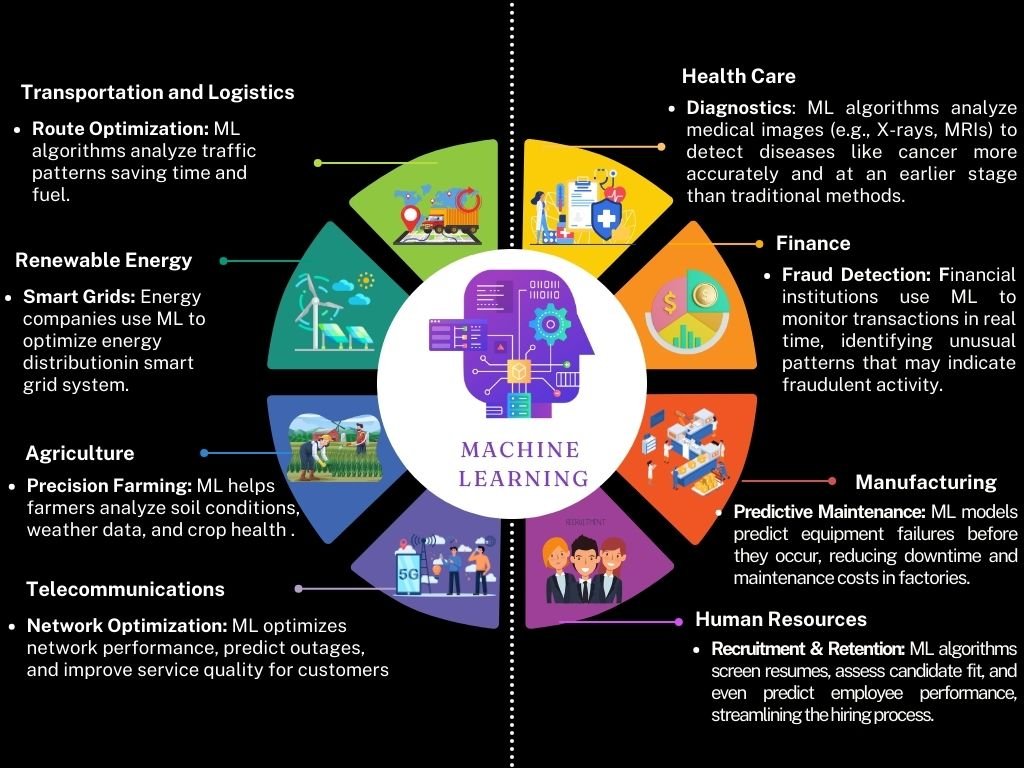The diverse ways industries are leveraging machine learning to enhance efficiency, drive innovation, and create value.
1. Healthcare
- Diagnostics: Machine learning algorithms analyze medical images (e.g., X-rays, MRIs) to detect diseases like cancer more accurately and at an earlier stage than traditional methods.
- Personalized Medicine: ML models predict how individual patients will respond to different treatments, enabling personalized healthcare plans.
2. Finance
- Fraud Detection: Banks and financial institutions use ML to monitor transactions in real time, identifying unusual patterns that may indicate fraudulent activity.
- Algorithmic Trading: ML algorithms analyze market data and execute trades at high speeds, optimizing investment strategies and maximizing returns.
3. Retail
- Customer Recommendations: E-commerce platforms like Amazon use ML to analyze customer behavior and suggest products that align with their preferences, boosting sales.
- Inventory Management: Retailers use ML to predict demand, optimizing inventory levels and reducing overstock or stockouts.
4. Manufacturing
- Predictive Maintenance: ML models predict equipment failures before they occur, reducing downtime and maintenance costs in factories.
- Quality Control: Machine learning systems inspect products on production lines, identifying defects and ensuring consistent quality.
5. Transportation and Logistics
- Route Optimization: ML algorithms analyze traffic patterns, weather conditions, and delivery schedules to determine the most efficient routes, saving time and fuel.
- Autonomous Vehicles: Self-driving cars use ML to process sensor data, make real-time decisions, and navigate complex environments safely.
6. Energy
- Smart Grids: Energy companies use ML to balance supply and demand, optimize energy distribution, and reduce waste in smart grid systems.
- Renewable Energy Forecasting: ML models predict the availability of renewable energy sources like solar and wind, improving grid reliability.
7. Agriculture
- Precision Farming: ML helps farmers analyze soil conditions, weather data, and crop health to optimize planting, irrigation, and harvesting, increasing yields and reducing waste.
- Pest Detection: ML models identify and monitor pests in crops, enabling timely interventions and reducing the need for pesticides.
8. Marketing
- Targeted Advertising: Advertisers use ML to analyze consumer data and create personalized ad campaigns that resonate with specific audiences.
- Sentiment Analysis: Companies analyze social media and customer feedback using ML to gauge public sentiment and adjust marketing strategies accordingly.
9. Human Resources
- Recruitment: ML algorithms screen resumes, assess candidate fit, and even predict employee performance, streamlining the hiring process.
- Employee Retention: ML models identify factors contributing to employee turnover, enabling companies to take proactive steps to retain talent.
10. Telecommunications
- Network Optimization: Telecom companies use ML to optimize network performance, predict outages, and improve service quality for customers.
- Customer Support: AI-powered chatbots handle routine customer inquiries, freeing up human agents to focus on more complex issues.





Hey people!!!!!
Good mood and good luck to everyone!!!!!
Your point of view caught my eye and was very interesting. Thanks. I have a question for you.
Can you be more specific about the content of your article? After reading it, I still have some doubts. Hope you can help me.
Thanks for sharing. I read many of your blog posts, cool, your blog is very good.
Can you be more specific about the content of your article? After reading it, I still have some doubts. Hope you can help me.
I don’t think the title of your article matches the content lol. Just kidding, mainly because I had some doubts after reading the article. https://accounts.binance.com/es-MX/register-person?ref=JHQQKNKN
Thank you for your sharing. I am worried that I lack creative ideas. It is your article that makes me full of hope. Thank you. But, I have a question, can you help me? https://accounts.binance.com/en-ZA/register?ref=JHQQKNKN
clomid remedio can i purchase clomiphene prices can i purchase generic clomiphene without insurance buy generic clomiphene without prescription can i buy cheap clomiphene tablets buying generic clomiphene tablets where to get cheap clomid pill
More articles like this would frame the blogosphere richer.
azithromycin 250mg without prescription – tindamax sale buy flagyl 400mg pills
buy semaglutide 14mg without prescription – buy cyproheptadine 4 mg online cyproheptadine oral
Your article helped me a lot, is there any more related content? Thanks!
buy domperidone generic – buy flexeril 15mg for sale cheap cyclobenzaprine 15mg
buy propranolol paypal – buy generic propranolol order methotrexate 2.5mg generic
amoxicillin tablet – buy generic diovan over the counter ipratropium 100 mcg pill
azithromycin 500mg canada – order nebivolol 5mg pills buy nebivolol 5mg generic
clavulanate for sale – atbioinfo.com buy ampicillin pill
buy esomeprazole 20mg – nexiumtous order esomeprazole 20mg pills
order coumadin 2mg without prescription – https://coumamide.com/ where to buy cozaar without a prescription
meloxicam tablet – tenderness buy meloxicam 15mg online cheap
order prednisone 20mg sale – aprep lson how to get prednisone without a prescription
best natural ed pills – buy ed pills us buy ed meds online
buy amoxil pills for sale – https://combamoxi.com/ how to get amoxicillin without a prescription
buy fluconazole generic – on this site buy diflucan pill
cenforce 50mg uk – click cenforce canada
cialis side effects a wifeРІР‚в„ўs perspective – teva generic cialis cialis 20mg price
Your point of view caught my eye and was very interesting. Thanks. I have a question for you.
tadalafil online canadian pharmacy – https://strongtadafl.com/# cialis cheapest price
order zantac generic – https://aranitidine.com/# zantac cheap
buy viagra cheap online uk – where to order viagra online generic sildenafil 100mg
Thanks on putting this up. It’s well done. buy nolvadex paypal
With thanks. Loads of conception! https://buyfastonl.com/amoxicillin.html
Thanks on putting this up. It’s okay done. https://ursxdol.com/sildenafil-50-mg-in/
More articles like this would pretence of the blogosphere richer. https://prohnrg.com/product/lisinopril-5-mg/
More posts like this would make the online elbow-room more useful. web
This is the amicable of glad I enjoy reading. https://ondactone.com/simvastatin/
Proof blog you be undergoing here.. It’s severely to find strong worth writing like yours these days. I truly appreciate individuals like you! Withstand mindfulness!!
maxolon ca
Greetings! Extremely gainful suggestion within this article! It’s the little changes which liking espy the largest changes. Thanks a lot towards sharing! https://experthax.com/forum/member.php?action=profile&uid=124576
I don’t think the title of your article matches the content lol. Just kidding, mainly because I had some doubts after reading the article.
brand dapagliflozin 10mg – https://janozin.com/# forxiga 10 mg uk
orlistat for sale – https://asacostat.com/ xenical us
Your article helped me a lot, is there any more related content? Thanks!
This website exceedingly has all of the tidings and facts I needed adjacent to this case and didn’t comprehend who to ask. http://anja.pf-control.de/Musik-Wellness/member.php?action=profile&uid=4726
Thanks for sharing. I read many of your blog posts, cool, your blog is very good.
Your point of view caught my eye and was very interesting. Thanks. I have a question for you. binance
Your article helped me a lot, is there any more related content? Thanks!
Can you be more specific about the content of your article? After reading it, I still have some doubts. Hope you can help me.
You can keep yourself and your family close being heedful when buying pharmaceutical online. Some pharmacy websites function legally and offer convenience, privacy, bring in savings and safeguards to purchasing medicines. buy in TerbinaPharmacy https://terbinafines.com/product/aricept.html aricept
Your article helped me a lot, is there any more related content? Thanks!
This is the amicable of topic I get high on reading. TerbinaPharmacy
More content pieces like this would make the интернет better.
Thanks for sharing. I read many of your blog posts, cool, your blog is very good.
Can you be more specific about the content of your article? After reading it, I still have some doubts. Hope you can help me.
Can you be more specific about the content of your article? After reading it, I still have some doubts. Hope you can help me.
Have you ever thought about adding a little bit more than just your articles? I mean, what you say is important and all. But think of if you added some great photos or videos to give your posts more, “pop”! Your content is excellent but with pics and clips, this blog could definitely be one of the greatest in its niche. Fantastic blog!
888slot888slot.com là một nền tảng cung cấp nhiều loại dịch vụ giải trí và cá cược nhằm đáp ứng nhu cầu khác nhau của người chơi. Hệ thống không chỉ là một nơi để cá cược, mà còn cung cấp nhiều hình thức giải trí thú vị khác.
888slot888slot.com là một nền tảng cung cấp nhiều loại dịch vụ giải trí và cá cược nhằm đáp ứng nhu cầu khác nhau của người chơi. Hệ thống không chỉ là một nơi để cá cược, mà còn cung cấp nhiều hình thức giải trí thú vị khác.
888slot888slot.com là một nền tảng cung cấp nhiều loại dịch vụ giải trí và cá cược nhằm đáp ứng nhu cầu khác nhau của người chơi. Hệ thống không chỉ là một nơi để cá cược, mà còn cung cấp nhiều hình thức giải trí thú vị khác.
When I originally commented I clicked the -Notify me when new comments are added- checkbox and now each time a comment is added I get four emails with the same comment. Is there any way you can remove me from that service? Thanks!
Downloaded the 30jiliapp – so convenient to play on the go! Runs smooth on my phone and the interface is pretty user-friendly. Thumbs up so far! Grab the app here: 30jiliapp
Hey all! Checked out 888pwin recently. It felt really user friendly to me. I have no complaints about it, but do your own research before playing. See for yourself at 888pwin.
I am continually browsing online for ideas that can aid me. Thank you!
Hey! This is my first visit to your blog! We are a team of volunteers and starting a new initiative in a community in the same niche. Your blog provided us valuable information to work on. You have done a extraordinary job!
Thanks for the auspicious writeup. It actually used to be a enjoyment account it. Glance complicated to far added agreeable from you! By the way, how can we be in contact?
Enjoyed studying this, very good stuff, regards. “Management is nothing more than motivating other people.” by Lee Iacocca.
You made some decent factors there. I appeared on the internet for the problem and found most individuals will associate with together with your website.
I believe other website owners should take this internet site as an example , very clean and excellent user pleasant pattern.
Another Rummy app! YonoRummyOnline is another fair option for online rummy lovers. Interface is clean. Give it a shot and see if you like what they’ve got: yonorummyonline
asia slot365 luôn đặt người chơi lên hàng đầu, do đó nhà cái này cung cấp dịch vụ hỗ trợ khách hàng 24/7, giúp giải quyết mọi thắc mắc vấn đề mà thành viên gặp phải trong quá trình tham gia cá cược. Đội ngũ nhân viên tại đây được đào tạo chuyên nghiệp, luôn sẵn sàng giải đáp mọi câu hỏi của người chơi một cách nhanh chóng và chính xác. TONY12-26
Your point of view caught my eye and was very interesting. Thanks. I have a question for you.
I don’t think the title of your article matches the content lol. Just kidding, mainly because I had some doubts after reading the article.
Got the 5500betapp on my phone. Works like a charm, no glitches or anything. Pretty convenient for betting on the go. Check it out: 5500betapp
I don’t think the title of your article matches the content lol. Just kidding, mainly because I had some doubts after reading the article. https://www.binance.info/register?ref=IXBIAFVY
Thank you for your sharing. I am worried that I lack creative ideas. It is your article that makes me full of hope. Thank you. But, I have a question, can you help me?
Your point of view caught my eye and was very interesting. Thanks. I have a question for you. https://accounts.binance.com/si-LK/register-person?ref=LBF8F65G
Yo, gold99login…not bad, not bad at all! Found it easily and the site’s design is good. Easy to login. Has potential for time investment, to be honest. Check it out yourself at gold99login.
Heard a lot about Jeet777game and finally decided to try it out. Gotta say, it’s pretty solid. The games are fun, and the site is easy to navigate. Definitely worth checking out if you’re looking for something new. Check it out here jeet777game
Been hunting for a VIP experience? PHVIP might just be it! The perks are pretty sweet, and the service is top-notch. If you’re looking for the high life, check this out. Get the VIP treatment here! phvip
online casino sports betting
online casinos for real money no deposit
online poker real money
mgm bet promo mgm bet betmgm Utah
Can you be more specific about the content of your article? After reading it, I still have some doubts. Hope you can help me.
Yo fam, b2xbetlogin! Heard it’s easy to set up an account. I will check it out later!. Take a peek for yourself b2xbetlogin
Gamebet Asia has a nice ring to it. Let’s see if they got some good deals for us. New customers should try this one! gamebet asia
HH55app, right? Downloading now, let’s see if it’s legit! Got a good feeling about this one. Worth it or not? Take a look hh55app
casino mcluck mcluckcasinogm.com mcluck Colorado